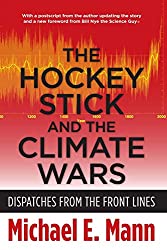
Rating: 7.6/10.
The Hockey Stick and the Climate Wars: Dispatches from the Front Lines by Michael E. Mann
A memoir by a climate scientist about the politics of climate change and the efforts of climate change denialists to sway public opinion on the subject. Initially there were some legitimate scientific debate about whether global warming was real and whether it was human-caused, but by the mid 1990s, the scientific community was in near-unanimous agreement that climate change is real. Yet the issue continues to be debated and politicized decades later.
The author did his PhD in climate science in the 1990s, studying historical natural variations in global temperatures such as the medieval warm period. His research was pushed to the front lines of the climate wars when denialists latched on to his work, claiming it proved climate change is natural and not human-caused. However, in reality, the natural factors cannot account for the rapid rise in temperatures at the latter half of the 20th century.
Climate denialists come from a variety of forms and scientific backgrounds. A common tactic is pointing out when scientists don’t even agree with each other, so we can’t know for sure that climate change is real. Disagreement is indeed a natural part of the scientific process, but scientists debate about nuanced issues like the technicalities of a statistical reconstruction method. On the surface, denialists attack scientific papers in similar ways, but the difference is they only attack research that don’t fit with a certain political view.
A number of politically powerful groups have tried to make life difficult for climate scientists, such as attacking them in public discourse, and making legal threats demanding them to provide research materials going back decades. This is meant to dissuade scientists from publishing results they don’t like, or working in the field altogether. In 2009, the email server of a climate research group was hacked, with the contrarians claiming evidence of fraud in the emails, but this evidence turned out to be not very convincing. On the whole, the tide is turning in favor of the scientists, and the contrarians arguments are viewed less and less as legitimate.
I found the book became a bit repetitive near the end, with many examples of contrarians using the same strategies to muddy the waters. The scientific portions were more interesting, such as the author’s research using statistical techniques to reconstruct historical temperature patterns by combining many types of proxy data. One question that was glossed over was what were the motivations of the denialist groups? There is some funding of this work by the oil industry although the author does not dig deeper into what is happening here.



